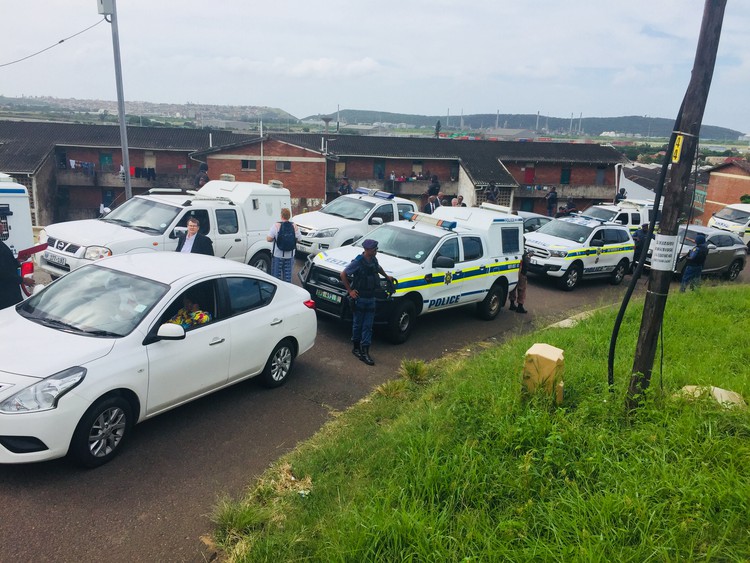Money collected from Glebelands residents was used to fund violence, says witness
Court visits scene of alleged murder
The trial against the “Glebelands Eight” resumed in the Pietermaritzburg High Court this week with an in loco inspection at the Gleblands hostel in Umlazi, Durban and testimony from a key state witness.
The eight accused — Bhekukwazi Mdweshu, Khayelihle Mbuthuma, Vukani Mcombothi, Eugene Hlophe, Mbuyiselwa Mkhize, Ncomekile Ntshangase, Mondli Mthethwa and Bongani Mbhele — face 22 charges, including nine for murder and seven attempted murder charges.
The hearing resumed on Monday, six months after it was adjourned in September 2019, when a state witness testifying in camera told the court how he was forced to flee Glebelands hostel. He had received several threats for being a hindrance to hitmen living in the hostel.
During a brief appearance on Monday, Xolani Sindane, the Legal Aid attorney representing Mbuthuma, Mcobothi, Mkhize, Ntshangase and Mthethwa, applied for the court to conduct an in loco inspection at the hostel. He argued that the inspection was necessary to refute the testimony given by the state witness who had implicated his clients in the killing of Siniko Ncayiyana in 2014.
Judge Nkosinathi Chili granted the inspection. The next day, under heavy armed police guard, the accused, along with the full court convoy, returned to Glebelands hostel. At the scene, Sindane demonstrated to the court that the state witness could not have seen what he alleged.
Witness says money collected from residents for attacks
On Wednesday, the state’s fourth witness who has been living under witness protection, began his testimony. He told the court that he first lived in Glebelands Block 47 in 1997 but moved in 2014 to Block 52, where he shared a room with the mother of his two daughters and another man.
“After I was expelled by one of the Block secretaries, I got a new shack at Mega Village close to Mega City. I left because I was scared,” he said.
The witness said he only returned to his room after some hostel residents approached him to come back.
The state witness said meetings were then held with one of the alleged hitmen, Bonga Hlophe (now deceased), about who was to be attacked in different blocks.
The witness described how money was collected from residents to pay lawyers and investigating officers so that cases against the perpetrators in the hostel would disappear.
He also testified that Mdweshu had hatched the plan to attack Block R. They discussed the plan in William Mthembu’s garage, said the witness. “Mdweshu, Mcobothi, Nathi Shezi and Lucas Ndlovu were present, and others I cannot remember were there,” he said.
“Mdweshu said he had a police friend he worked with in Durban Central police station who promised to sell him an R5 gun [rifle] for R9,000. Bonga then ordered the secretaries of the blocks to collect the money from the residents. We were never told how much money was collected. Some of the money was taken by Bonga and Mbhele,” he alleged.
Two days later, he said, Mdweshu, Eugene and Mkhize (accused number 5) were present when Mdweshu announced that they would be attacking Block R.
“Mdweshu said we will meet next to the swimming pool. I found Mdweshu already there. Ntshangase looked for the guns in the bag and loaded bullets. Mdweshu said Ntshangase will use the AK-47 because he knew how to use it. Mdweshu used the R5,” said the witness.
He said he was told to keep a lookout for police. After the shootings, he said that he found Mdweshu between Block 46 and 47, with a thigh injury. “He was with Mcobothi, Eugene and Ntshangase,” said the witness.
State prosecutor Dorain Paver asked how the witness knew Mdweshu was injured. He responded: “Mdweshu told us that ‘those dogs from Block R hit him’. Mdweshu was taken to hospital in his car by his cousin.”
The trial resumes on Thursday.
Support independent journalism
Donate using Payfast

Next: Covid-19: Here’s what occupations in Cape Town are doing in response to the pandemic
Previous: Judge bars lawyers from collecting fees for “vexatious” land claim case
© 2020 GroundUp.
This article is licensed under a Creative Commons Attribution-NoDerivatives 4.0 International License.
You may republish this article, so long as you credit the authors and GroundUp, and do not change the text. Please include a link back to the original article.

